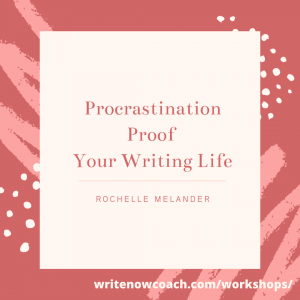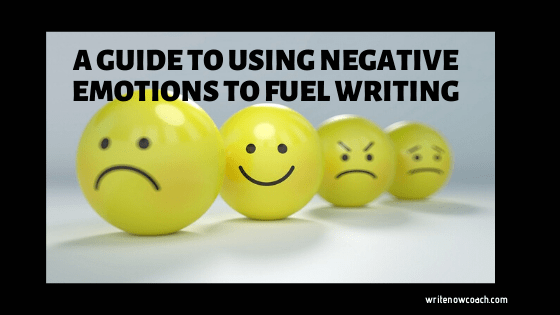A Guide to Using Negative Emotions to Fuel Writing
11 February 2020
Note From Rochelle
Dear Writers,
Do you put off working on your writing projects until you:
- Know more
- Feel less afraid
- Are inspired
- Have more time
- Feel motivated
You’re not alone. Although only 20 percent of people identify as chronic procrastinators, a whopping 88 percent of people admit that they procrastinate during the workday.
The popular belief is that we procrastinate because we’re poor at planning or managing our time. That’s not true!
Procrastination is a learned behavior. We procrastinate because we’re afraid. We worry that we’re not good enough or we’re afraid we’ll make the wrong decision.
But there is hope! At my class, Procrastination Proof Your Writing Life, you will learn:
- The different types of procrastinators–are you a dreamer, defier or perfectionist?
- The situations that tend to trigger procrastination (so that you can avoid them)
- How do develop a mindset that will help you overcome procrastination
- The habits you can use to stop procrastinating
- The tools you can use to get work done
 If you want to attend Procrastination Proof Your Writing Life, sign up at my workshop page. It’s completely free to attend live. And note: the sign up tool is a little wonky! Once you click schedule appointment, you will need to set your time zone, then click on the date (March 2) and choose “continue” before you can enter your information.
If you want to attend Procrastination Proof Your Writing Life, sign up at my workshop page. It’s completely free to attend live. And note: the sign up tool is a little wonky! Once you click schedule appointment, you will need to set your time zone, then click on the date (March 2) and choose “continue” before you can enter your information.
I am delighted to welcome Brandi-Ann Uyemura to the blog today to talk about how to use negative emotions to fuel our writing.
Enjoy!
Rochelle

A Guide to Using Negative Emotions to Fuel Writing
By Brandi-Ann Uyemura
As a writer, I’m sure you’re familiar with negative emotions. In fact, you may be more familiar than you’d like. They encompass everything from fear and anger to frustration, disappointment and even grief. This can be the result of what’s going on in our lives or writing itself. While many will tell you to compartmentalize these emotions and keep on writing, I know there’s another, better way. I have a Masters in counseling psychology and spent the last 9 years as an associate editor for a psychology website, I’ve learned to not just cope, but use negative emotions to inform my writing and I’m going to show you how to do the same.
Negative emotions don’t get the respect they deserve. Nobody really wants to know that you’re suffering when they ask, “How are you?” But trying to shove your feelings under a rug won’t make them disappear. Emotions are here for a reason. They signal an area that needs attention.
- Maybe there’s something that feels unsafe about what you’re writing.
- Maybe you’re submerged in a sea of publishing hopelessness.
- Maybe you need time to simply not write and go for a walk or meditate so you can tune into what you’re feeling.
But you won’t know unless you pay attention.
Sometimes the thoughts sound like this: “I’m terrified that I’m a horrible writer and if I release this out into the world everyone will find out.”
Every writer has his or her own version of this story. But if you don’t tune in, it could sabotage your work.
Early on in my writing career, I had zero years of experience to accommodate the rich publishing opportunities that came my way. To deal with the nagging thought that I was a fraud, I tried not to think about it. When I thought about what I was trying to accomplish, I’d be paralyzed into writer’s block. In the end, it made for embarrassing mistakes and errors.
Listen to Your Emotions
You can regain control by listening to what you’re feeling so you can take necessary action. Your inner voice might be saying that a piece isn’t ready to submit or requires another pair of eyes. If something’s missing and you’re not paying attention, you’re losing a huge opportunity to make your writing sing.
Writing consciously means being aware that the voices in your head about being a bad writer or not accomplishing enough are not factual statements. They are simply feelings that require attention, compassion, and a chance to be heard. If you approach it this way then you won’t freak out every time you confront a blank page. You know that everything is solvable and that none of it equates with being a bad writer. That mind-shift is a game changer.
Release Your Emotions
Emotions are just energy that needs to be released. In Sounds True’s recent Radical Compassion Challenge, meditation teacher Tara Brach interviewed author Elizabeth Gilbert. She said that the voice of self-compassion is always with her when she writes. I just interviewed an author for my blog who recommends writers journal to relieve their anxiety. Everybody feels the anxiety—those published and those trying to get published. We just learn how to deal with it. And the wise ones learn how to use it.
Give yourself that same privilege by asking the following questions and then listen nonjudgmentally for the answers.
- What is bothering me most right now?
- What am I most afraid of?
- What do I think will happen if I write this?
- Whose judgment do I fear the most?
- What steps can I take to alleviate some of this worry?
Use Your Emotions
There’s this great scene in my favorite movie Something’s Gotta Give where Diane Keaton’s character pauses to ugly cry in between writing sentences. She’s using grief to bring life to her words. There are multiple ways you can do this.
That’s the exciting thing about being a writer—almost everything you experience can be used in your writing. My picture book was created from my worries about the environment. I’ve penned essays about the difficulties of being a parent, my obsession with numbers, and a toilet overflowing. I got an actual written letter from a reader who was moved by a short response to a question I answered for O magazine. If you take these heated, terrifying, and grief stricken moments and use them to fuel your writing, it has the potential to inspire change. If you survived it, somebody will want to read it.
Write everything down
When you’re in the middle of dealing with a flooding apartment, it might not be the right time to complete an essay about it, but you’ll do your future self a favor if you document all the details. Record what happened and how you are feeling so you can turn it into a publishable piece when you’re ready.
That’s why I think we write: to artfully express the human experience. It’s a way to connect us to our own emotions, understand and process the ups and downs in our lives, and share it with others. Detachment creates cold, disembodied prose. Your whole self needs to be involved in your writing. In order to produce a piece worthy of your talent, skill, and creativity, you need to show up. That means showing up with all of your emotions, joy, and sorrow. It’s the only way to be there for the reader and most importantly, your self.
 About the author. Brandi-Ann Uyemura is a counseling psychology graduate whose been freelance writing for a decade, which includes getting to work as an associate editor for Psych Central and online columnist for The Writer. She has bylines in various places like Spirituality & Health, Intuit and Whole Life Times. Her ghostwritten pieces have been published online onYoga Journal, USNews.com and MindBodyGreen. Currently, she coaches and blogs to help creatives find and pursue their purpose at TheInspiringBee.com, and writers build up their emotional resilience at Brandi-AnnUyemura.com. You can find her on Instagram (https://www.instagram.com/theinspiringbee/) where she posts pictures of her life on Oahu raising her two sons and working on children’s fiction.
About the author. Brandi-Ann Uyemura is a counseling psychology graduate whose been freelance writing for a decade, which includes getting to work as an associate editor for Psych Central and online columnist for The Writer. She has bylines in various places like Spirituality & Health, Intuit and Whole Life Times. Her ghostwritten pieces have been published online onYoga Journal, USNews.com and MindBodyGreen. Currently, she coaches and blogs to help creatives find and pursue their purpose at TheInspiringBee.com, and writers build up their emotional resilience at Brandi-AnnUyemura.com. You can find her on Instagram (https://www.instagram.com/theinspiringbee/) where she posts pictures of her life on Oahu raising her two sons and working on children’s fiction.








